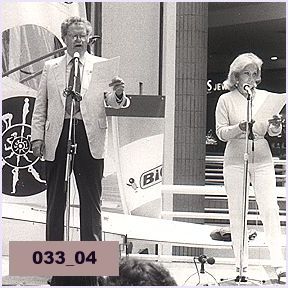cataroo.com
Home of John Cawley
Dedicated to My Wife & Times - A Site for Sore Eyes
Back To Archives
Back To Main Page
|
Frames of Time... 033_04 - A Great Scott By the time I had met Bill in the 1970s, his major claims to fame had gone by. The classic Jay Ward characters Bullwinkle, George of the Jungle and others were merely repeats. However, he was still active. He was doing voice work for Jay Ward commercials and various TV productions. He was also still President of ASIFA-Hollywood, and one of the organization's two driving forces during the 1970s and 80s. (June Foray, also seen in the photo, was another.) It was during his reign as President that I got to spend most of my time with Bill. I had taken over the reigns of editing ASIFA-Hollywood's newsletter Grafitti from Bill. This, along with my work at helping out at various ASIFA-Hollywood events, kept me in frequent touch with Bill. To many, Bill was a talented voice artist and creator. Bill's origins were in the studio cartoons of 1940s and 1950s. But it was in TV, together with Jay Ward, that Bill created a unique sense of humor and visuals still emulated today. When modern animation creators are asked about influences, along with Disney and Warner Bros, Jay Ward is frequently mentioned. And any mention of Jay Ward is a mention of Bill Scott. Bill was a man of integrity. He always stood up for his beliefs, and was equally willing to announce them. Bill disliked the terms "gagman" and "story man". Having written for theatrical cartoons, as well as the Jay Ward shows, Bill was adamant that he had been a writer. "We created stories, characters and dialogue," he would tell me. "Just because I worked with storyboard artists", did not diminish his skill or title. Bill disliked the idea of Japanese animation. In his mind, overseas animation had been the key factor to stealing jobs from U.S. artists. Even though the Jay Ward cartoons were animated in Mexico, thus taking jobs from U.S. animators, he never saw the correlation. He once commented that the Jay Ward series was a single show, whereas by the 1970s, the East had stolen every show. As President of ASIFA-Hollywood, he ran the organization as a kingdom. He ruled over events, plans and business as a king oversaw his castle. When he supported an idea, little could stop it. When he disapproved of an idea, no amount of support could make it happen. When the organization was short of money, as it often was, he would pay out of his pocket claiming ASIFA could pay him back "later". Most of all, Bill was a great people person. Unlike many animators who seemed to be a bit shy, Bill loved to be out among the public. He reveled in the spotlight. It didn't matter if the group was a small gathering of animation professionals at a private event, or the general public at an ASIFA event like the Cel-Ebration; which by this time was taking place at shopping malls and attracting hundreds of people interested in the secrets of animation. Of course, Bill had his darker side. Like the foreign animator, if one were to get on his bad side, one would never be able to regain favor. Those who knew Bill well, knew not to bring up certain creators' names in his presence, or suggest they receive an honor from ASIFA-Hollywood. Bill also seemed to feel that the great talents in animation had already been around. He was dubious of newer (i.e. younger) creators. That is not to say that Bill couldn't converse with them and be pleasant and supportive. When ASIFA was holding their big Cel-Ebrations, it was imperative to have stage shows filled with voice talent and desks filled with artists. Of course, he knew the best folks for each position, and had the skills to attract many a "big name". However, sometimes the big names would back out, make excuses, or simply not show. He then had to utilize someone just starting out in the business, or even someone who was merely a volunteer. At those times, he would approach the person with the same respect as if they were an old timer. The only difference would be he might take time to coach them a little, offering his words of support and wisdom. I never saw it fail to make the person smile and feel important. As I said, Bill was a people person and could make anyone feel at ease. When animation lost Bill in 1985, it lost more than a talent. It lost a true statesman.
Back To Archives Back To Main Page |
 Bill Scott was one of the most gifted talents in animation.
Bill Scott was one of the most gifted talents in animation.